Greek mythology continues to captivate readers worldwide, with National Geographic Kids reporting that their Greek myths content receives thousands of enthusiastic comments from readers who describe these stories as “awesome,” “cool,” and essential for school projects. I remember discovering Perseus and Medusa as a child through a tattered library book, completely mesmerized by the hero’s clever use of his shield’s reflection to defeat the monster. That moment sparked my lifelong fascination with Greek storytelling, and according to National Geographic Kids, I’m far from alone in this experience.
Look, these old stories aren’t just cool adventures (though they definitely are that). They’re like having a really wise friend who’s been through everything and can give you advice about life’s messiest situations. Whether you’re exploring heroic journeys, passionate love affairs, or divine interventions, Greek stories remain remarkably relevant for modern readers seeking both wisdom and compelling narratives.
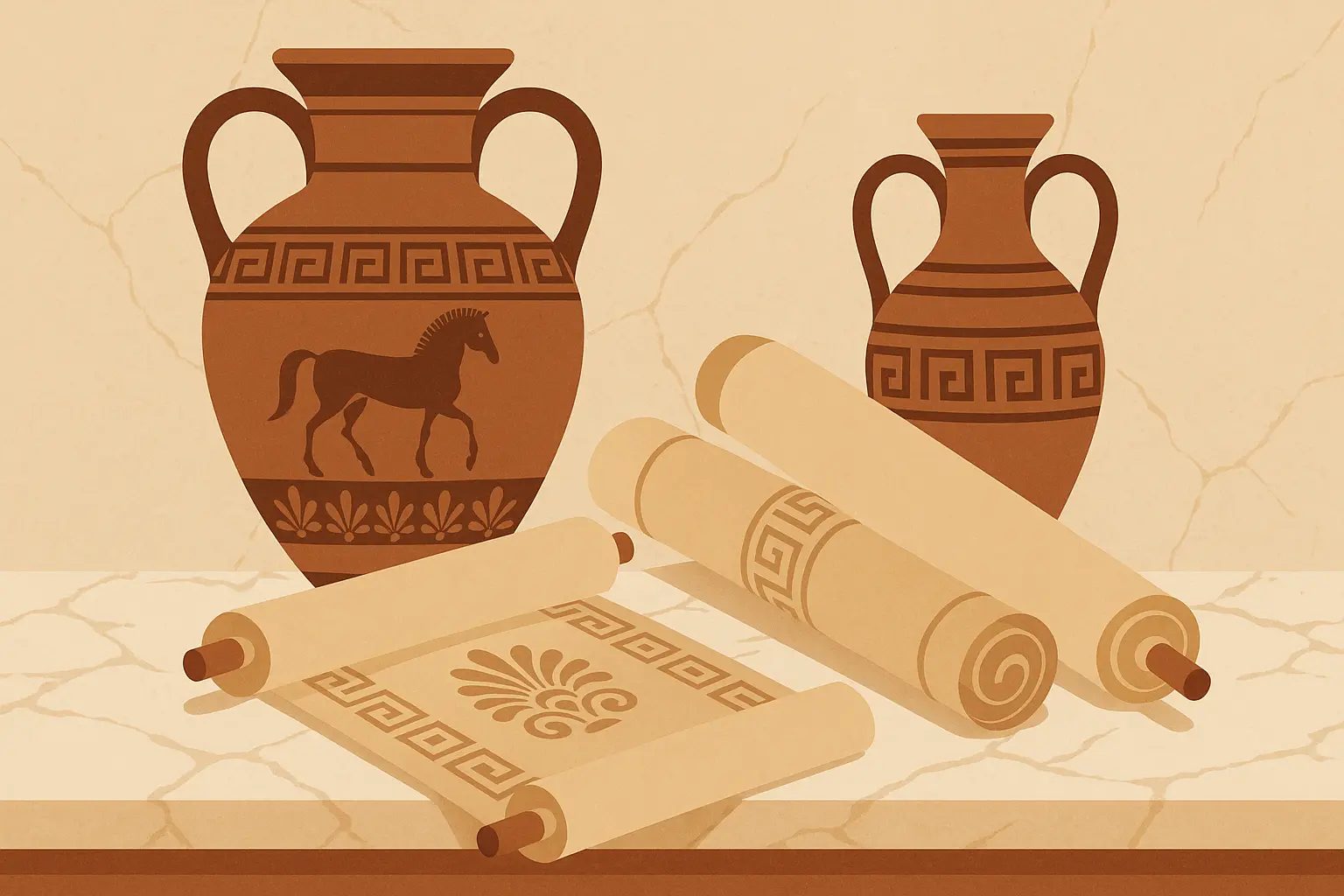
Table of Contents
-
How I Picked These Stories (And Why You Should Care)
-
Top 25 Greek Stories Across 6 Categories
-
Heroic Journeys and Quests
-
Love, Passion, and Relationships
-
Family Drama and Betrayal
-
Divine Intervention and Cosmic Order
-
Transformation and Metamorphosis
-
Wisdom, Justice, and Moral Lessons
-
-
The Stories That’ll Stick With You
-
Do These Stories Actually Hold Up Today?
-
How Nairrate Can Help You Create Your Own Epic Stories
-
Why These Stories Still Matter
TL;DR
-
Greek stories tackle the same stuff we deal with today: love, betrayal, heroism, justice, and those impossible moral choices
-
These 25 essential stories cover everything from epic quests to family drama that makes your relatives look normal
-
Some are straightforward life lessons, others will mess with your head for days
-
They’re basically the blueprint for every story you’ve ever loved
-
Greek mythology proves that humans have been complicated for thousands of years
-
These ancient stories still influence everything from Marvel movies to your favorite TV shows
-
They’re both entertaining and weirdly therapeutic for understanding human nature
How I Picked These Stories (And Why You Should Care)
When choosing which Greek stories to prioritize, I needed clear criteria that help identify the most valuable and impactful tales. The best Greek stories combine cultural significance with modern relevance, offering both historical importance and contemporary applicability—basically, they need to be stories that still hit hard today.
Here’s the thing about Greek heroes and their wild adventures: the stories that have lasted share certain characteristics. They address universal human experiences, demonstrate storytelling techniques that still work, provide educational value, and offer rich material for creative adaptation and personal reflection. These criteria help separate the truly essential tales from the hundreds of myths that have survived from ancient Greece.
|
Selection Criteria |
High Priority Examples |
Medium Priority Examples |
How I Figured This Out |
|---|---|---|---|
|
Cultural Significance |
The Odyssey, Oedipus Rex, Trojan War |
Perseus & Medusa, Orpheus & Eurydice |
How often people reference them in everyday conversation |
|
Modern Relevance |
House of Atreus (family trauma), Prometheus (tech ethics) |
Daphne & Apollo (consent), Cassandra (ignored warnings) |
Whether they help explain current situations |
|
Educational Value |
Heracles’ Labors (perseverance), Judgment of Paris (consequences) |
King Midas (materialism), Narcissus (self-obsession) |
How clearly they teach life lessons |
|
Literary Merit |
Complex character development, sophisticated themes |
Clear story structure, memorable symbolism |
Whether they’re actually well-told stories |
Cultural Significance and Historical Context
Greek mythology forms the foundation of Western literature and storytelling. You know how some movies just stick with you? These Greek stories figured out that formula way before Hollywood existed. These foundational stories appear repeatedly in literature, art, and popular culture because they established narrative patterns that writers still follow today.
Understanding these cultural foundations becomes even more valuable when considering how they relate to universal story themes that continue to shape modern narratives. The mythology we encounter in ancient Greek tales provides the blueprint for countless contemporary works.
Why These Stories Still Hit Different
The most enduring Greek stories address universal human experiences: love, betrayal, heroism, justice, family dynamics, and moral dilemmas. These timeless themes make ancient stories applicable to contemporary situations and personal growth.
Consider how the story of Cassandra resonates with modern climate scientists who warn about environmental disasters but struggle to convince skeptical audiences. Cassandra possessed accurate knowledge about future consequences but faced the frustration of being dismissed or ignored. Ever had a friend who just wouldn’t listen to your warnings? That’s Cassandra’s whole deal, and it’s infuriating every single time.
You’ll find that the best Greek myths speak directly to modern challenges, offering insights into human behavior that remain as relevant today as they were thousands of years ago.
Narrative Complexity and Literary Merit
Some of these stories are pretty straightforward—don’t be greedy (Midas), don’t be too vain (Narcissus). Others are layered like an onion and will make you think for days. Greek myths often feature sophisticated narrative devices including dramatic irony, foreshadowing, and complex character arcs that can enhance your understanding of effective storytelling.
These narrative techniques mirror many of the principles found in great fiction examples that demonstrate timeless storytelling mastery. The mythology of ancient Greece provides excellent examples of how to craft compelling narratives that continue to influence modern writers.
Educational and Inspirational Value
Look, some of these stories will teach your kids not to be jerks (Narcissus), others will help you understand why your family is the way it is (House of Atreus), and a few will just blow your mind with how clever they are (Odyssey). Many Greek myths serve as cautionary tales or provide models for overcoming adversity.
Greek mythology serves as both mirror and guide, reflecting our deepest fears and highest aspirations while providing frameworks for understanding complex moral situations that don’t have easy answers.
Top 25 Greek Stories Across 6 Categories
These 25 essential Greek stories represent the finest examples of ancient storytelling, organized into six distinct categories that showcase different aspects of human experience. From heroic adventures that test courage and determination to love stories that explore passion and devotion, each category offers unique insights into the human condition.
The stories range from complex epics requiring deep analysis to simpler tales with clear moral lessons, ensuring accessibility for readers at all levels while maintaining the sophisticated storytelling that has made these Greek mythology tales endure for millennia. Each Greek story provides a window into both ancient wisdom and timeless human truths.
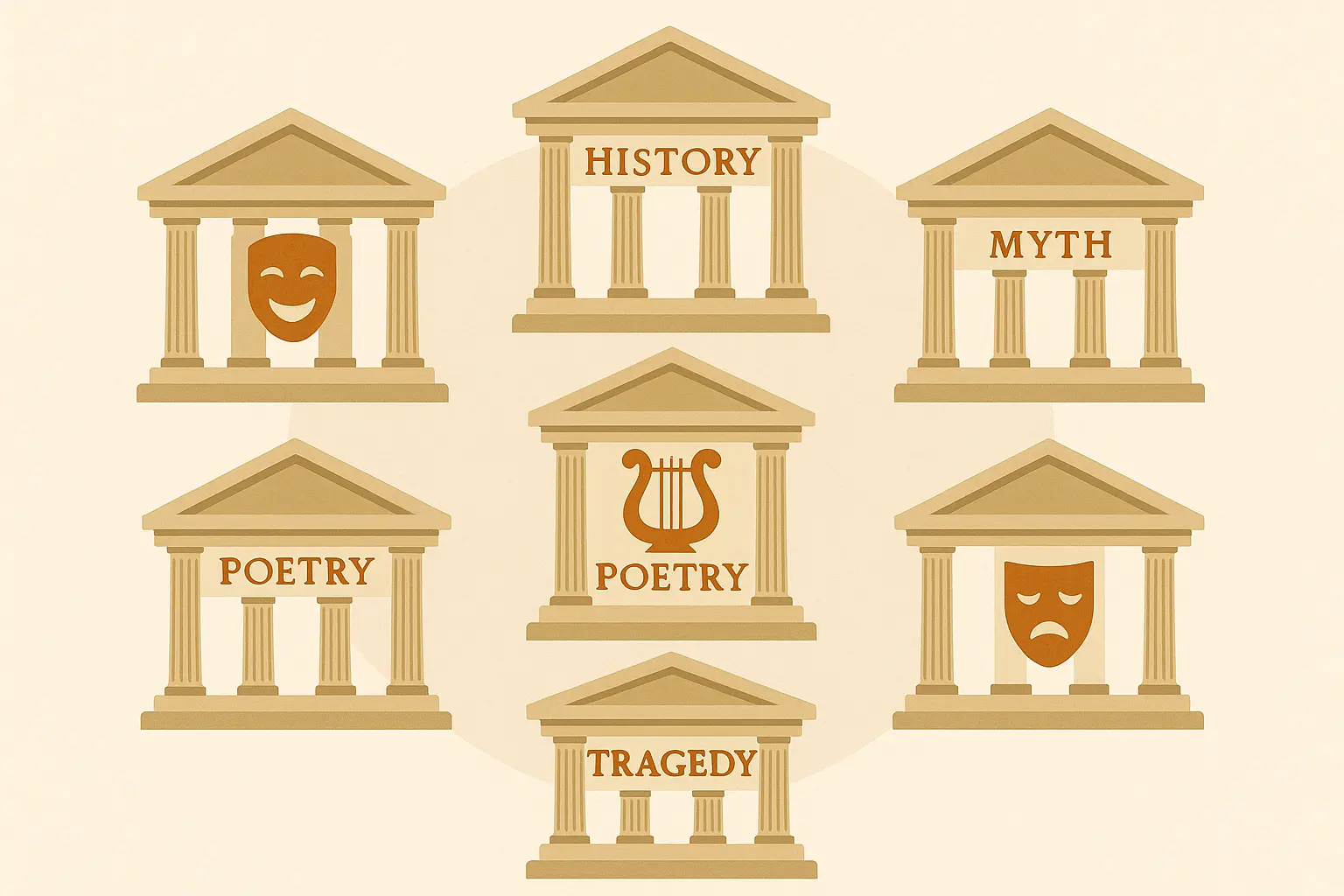
Heroic Journeys and Quests
If you like adventure movies: Start with the hero stories—they’re basically ancient Marvel movies. Heroic journey stories represent the pinnacle of Greek adventure narratives, featuring protagonists who face seemingly impossible challenges while demonstrating courage, cleverness, and perseverance. These tales established the hero’s journey pattern that continues to influence modern storytelling, from blockbuster films to contemporary novels.
Each story combines physical challenges with moral tests, showing how heroes must grow internally while overcoming external obstacles. The mythology surrounding these heroes provides templates for personal growth that remain relevant today.
1. The Odyssey
The Odyssey is like the ultimate “everything that could go wrong, did go wrong” travel story. Homer’s epic follows Odysseus’s ten-year journey home after the Trojan War, and honestly, this guy could not catch a break. This foundational story explores themes of perseverance, loyalty, and the consequences of pride—basically what happens when you’re too clever for your own good.
Odysseus faces supernatural challenges, moral dilemmas, and tests of character that mirror modern struggles with adversity and personal growth. Each episode provides lessons about temptation, duty, and the importance of maintaining focus on long-term goals despite immediate pleasures or obstacles (looking at you, Lotus Eaters). The Greek myths surrounding Odysseus demonstrate how intelligence and adaptability often triumph over brute strength.
2. Perseus and Medusa
Perseus is basically the guy who brought a mirror to a monster fight and somehow made it work. Genius or lucky? You decide. Perseus’s quest to slay the Gorgon Medusa demonstrates courage in the face of seemingly impossible odds. Armed with divine gifts and clever strategy, he overcomes a monster whose gaze turns viewers to stone.
This story emphasizes the power of preparation, divine assistance, and creative problem-solving. Perseus succeeds through intelligence and careful planning rather than brute force—he basically said “I’m not looking at this thing directly” and used his shield like a rearview mirror. Sometimes the simplest solutions are the smartest. The mythology teaches us that the right tools and approach can overcome seemingly insurmountable obstacles.
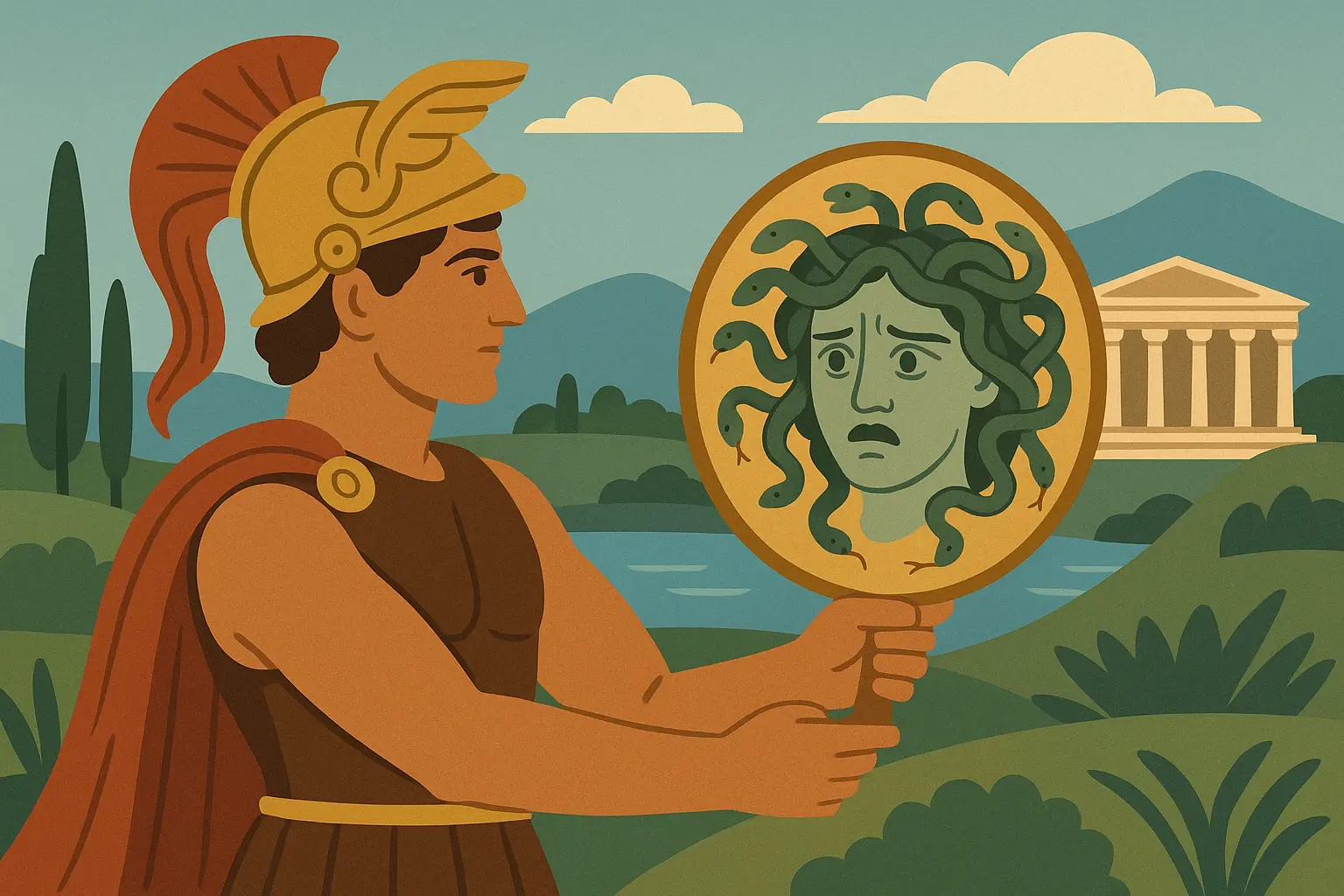
3. Theseus and the Minotaur
The Athenian hero volunteers to enter the labyrinth and face the half-man, half-bull Minotaur to save his city’s youth. With Ariadne’s help (because even heroes need a good wingwoman), he navigates the maze and defeats the monster. This tale highlights sacrifice for the greater good, the importance of allies, and finding one’s way through complex challenges.
The labyrinth serves as a powerful metaphor for life’s confusing paths and the need for guidance and determination. Greek mythology often uses such symbols to represent internal struggles and the journey toward self-discovery. Plus, it’s a great reminder that sometimes you need to ask for directions.
4. Jason and the Argonauts
Jason’s quest for the Golden Fleece brings together legendary heroes on an epic adventure—think Ocean’s Eleven, but with more sea monsters. The story emphasizes teamwork, leadership challenges, and the price of ambition. Jason’s relationship with Medea adds layers of passion, betrayal, and the consequences of broken promises (spoiler alert: don’t mess with a sorceress).
This tale demonstrates how achieving great goals often requires collaboration and how personal relationships can complicate professional or heroic endeavors. The mythology surrounding the Argonauts shows that even the greatest heroes need support from others, and that sometimes the real treasure is the friends you make along the way.
5. Heracles’ Twelve Labors
The strongest of Greek heroes must complete twelve seemingly impossible tasks as penance for his actions. Fun fact: Heracles had to clean out stables that hadn’t been cleaned in 30 years. Even superheroes have to do gross chores. Each labor represents different types of challenges: brute strength, cleverness, endurance, and moral fortitude.
This cycle demonstrates redemption through perseverance and personal growth. Heracles shows that even the mightiest individuals must face consequences for their mistakes and can achieve redemption through dedicated effort and personal transformation. The mythology teaches that true strength comes from accepting responsibility and working to make amends.
Love, Passion, and Relationships
If you’re going through relationship drama: The love stories will make you feel better (or worse) about your situation. Greek love stories explore the full spectrum of romantic experience, from devoted partnerships that transcend death to passionate affairs that destroy kingdoms. These tales examine both the transformative power of love and its potential for destruction, offering insights into human relationships that remain remarkably relevant.
The stories demonstrate how love can inspire great art, drive people to extraordinary lengths, and create conflicts between personal desires and social responsibilities. These romantic narratives share many characteristics with traditional folktales that explore love’s power to transform both individuals and entire communities.
Greek mythology presents love as a force that can elevate or destroy, depending on how it’s channeled and expressed.
6. Orpheus and Eurydice
Can we talk about how Orpheus literally sang his way into Hell and almost pulled it off? That’s some serious talent. The greatest musician in Greek mythology loses his beloved wife to a snake bite and journeys to the underworld to retrieve her. His music moves even Hades, but his lack of faith at the crucial moment teaches about trust, loss, and the power of art to transcend death.
This story explores how love can motivate incredible achievements while also showing how doubt and impatience can destroy what we most desire to preserve. The mythology demonstrates that love requires faith and patience to survive its greatest tests. It’s also a reminder that sometimes the hardest part isn’t getting what you want—it’s trusting that you deserve to keep it.
7. Pygmalion and Galatea
A sculptor creates the perfect woman in marble and falls in love with his creation. Aphrodite brings the statue to life, exploring themes of idealization, the nature of love, and the power of artistic passion to transform reality. This is either the most romantic story ever or the creepiest, depending on your perspective.
This tale raises questions about whether we love people for who they truly are or for our idealized versions of them, making it particularly relevant to modern discussions about relationships and expectations. Greek mythology often examines the difference between fantasy and reality in human connections—basically, the original “she’s not like other girls” story.
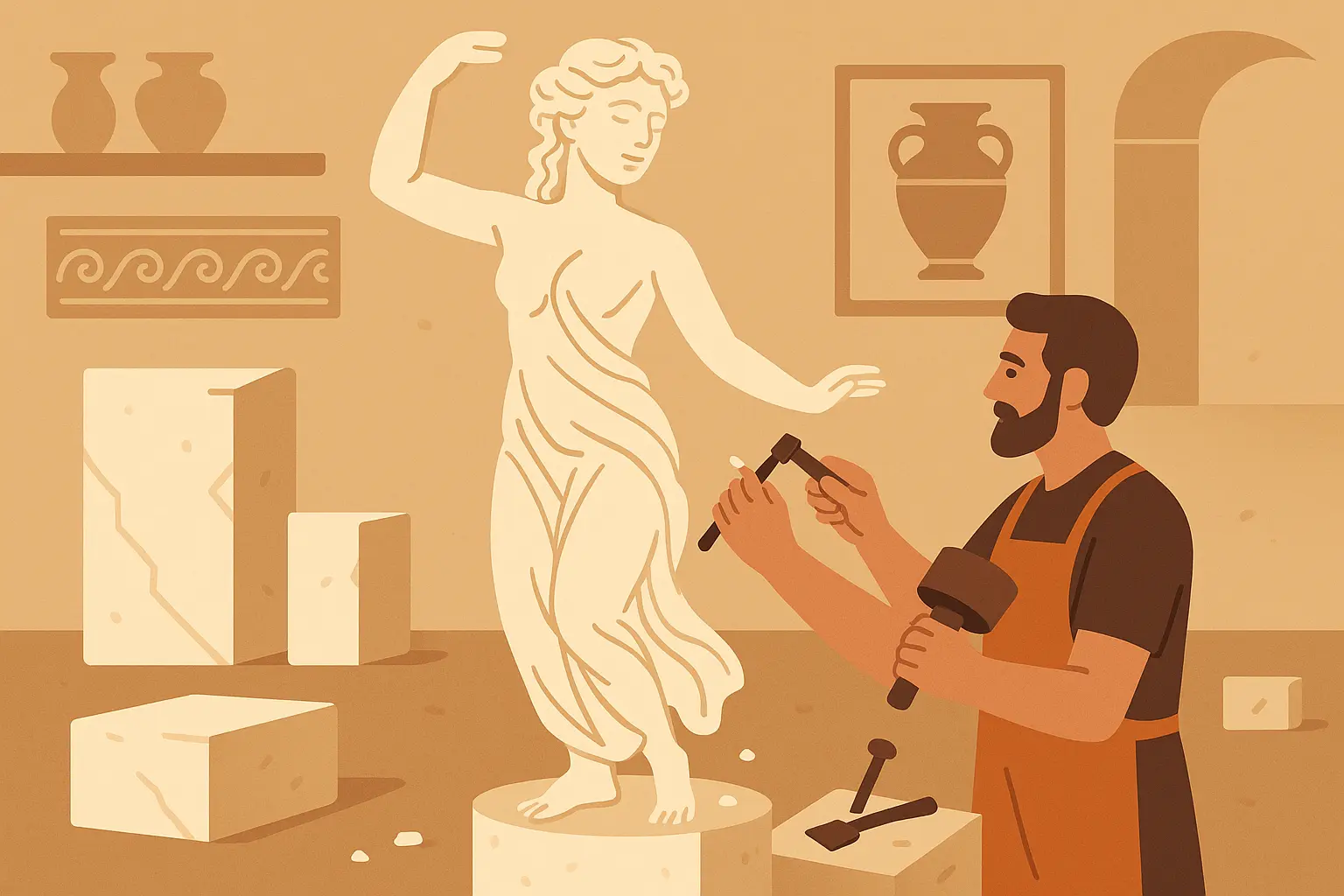
8. Paris and Helen of Troy
The love affair that launched a thousand ships and sparked the Trojan War examines how personal desires can have far-reaching consequences. This story explores the tension between individual happiness and social responsibility—basically, when your relationship drama starts a ten-year war.
Paris and Helen’s passion demonstrates how personal choices can affect entire civilizations, raising questions about the balance between following your heart and considering broader consequences. The mythology shows that love can be both beautiful and destructive, and sometimes the hottest relationships cause the biggest problems.
9. Psyche and Eros
A mor
9. Psyche and Eros
A mortal woman’s beauty rivals Aphrodite’s, leading to a complex tale of jealousy, forbidden love, and trials that test true devotion. The story emphasizes that genuine love requires trust, perseverance, and the willingness to face challenges together. Also, never trust your jealous sisters when they give you relationship advice.
Psyche must prove her love through difficult tasks, showing that lasting relationships require effort, faith, and commitment beyond initial attraction. Greek myths often teach that true love must be earned and maintained through dedication—no shortcuts to happily ever after.
Family Drama and Betrayal
If you need a good cry: Family drama section. Bring tissues. Greek family dramas reveal the dark side of human relationships, exploring how betrayal, revenge, and unresolved conflicts can destroy families across generations. These stories serve as cautionary tales about the cycles of violence and the importance of breaking destructive patterns.
They demonstrate how family trauma perpetuates itself and examine the difficult choices individuals face when loyalty to family conflicts with moral principles. The mythology provides stark warnings about the consequences of unresolved anger and the need for forgiveness. And you thought your family had drama.
10. The House of Atreus
The House of Atreus is like a soap opera written by someone having a really bad day. It’s brutal, but you can’t look away. This multigenerational saga of curse and revenge includes Agamemnon’s sacrifice of his daughter Iphigenia, Clytemnestra’s revenge, and Orestes’ matricide. It explores how violence begets violence and the struggle to break cycles of family trauma.
The story shows how one act of betrayal can echo through generations, affecting innocent family members and demonstrating the importance of choosing forgiveness over revenge. Greek mythology often explores how past actions continue to influence future generations, creating patterns that seem impossible to break.
11. Oedipus Rex
And yes, you read that right—Oedipus literally married his mom. Greek mythology does NOT mess around. Sophocles’ tragic hero unknowingly fulfills a prophecy by killing his father and marrying his mother. This story examines fate versus free will, the danger of hubris, and how our attempts to avoid destiny often lead us directly to it.
Oedipus’s tragedy demonstrates how the truth can be both liberating and devastating, and how our efforts to control our fate sometimes ensure its fulfillment. The mythology teaches that wisdom often comes at a terrible price, and sometimes what you don’t know really can hurt you.
12. Medea
Jason’s abandoned wife takes terrible revenge by killing their children. I’ll be honest—when I first read about Medea killing her own children, I had to put the book down. It was too intense. But that’s exactly why these stories stick with you. Euripides’ tragedy explores the fury of a woman scorned, the clash between different cultures, and how betrayal can transform love into destructive rage.
Medea’s story serves as a powerful examination of how abandonment and cultural displacement can drive someone to unthinkable acts, making it relevant to modern discussions about domestic violence and cultural integration. Greek mythology doesn’t shy away from examining the darkest aspects of human nature—it forces us to confront what happens when love turns to hate.
13. The Trojan Women
This post-war tragedy follows the surviving women of Troy as they face slavery and separation. It powerfully depicts the human cost of war, the strength of women in adversity, and the dignity that can be maintained even in defeat. Real talk—this story hits different when you’re an adult and understand what these women actually lost.
The story focuses on the often-overlooked victims of conflict, showing how war’s consequences extend far beyond the battlefield to affect entire communities and families. The mythology reminds us that every conflict has innocent victims whose stories deserve telling.
Divine Intervention and Cosmic Order
Stories of divine intervention explore the relationship between mortals and gods, examining themes of power, justice, and the natural order. These tales demonstrate how divine actions affect human lives and how mortals must navigate relationships with beings far more powerful than themselves. Seriously, ancient Greeks had some wild imaginations.
They also explore the consequences of challenging divine authority and the price of progress and knowledge. Greek mythology presents the gods as powerful but flawed beings whose actions often mirror human weaknesses on a cosmic scale.
14. Prometheus Steals Fire
The Titan’s gift of fire to humanity represents the price of progress and knowledge. His eternal punishment by Zeus explores themes of sacrifice for others, the tension between authority and innovation, and the responsibility that comes with power. This is why you always read the fine print on wishes.
Prometheus’s story remains relevant to modern discussions about technological advancement, whistleblowing, and the costs of challenging established authority for the greater good. The mythology teaches that progress often requires individuals willing to sacrifice for the benefit of others.
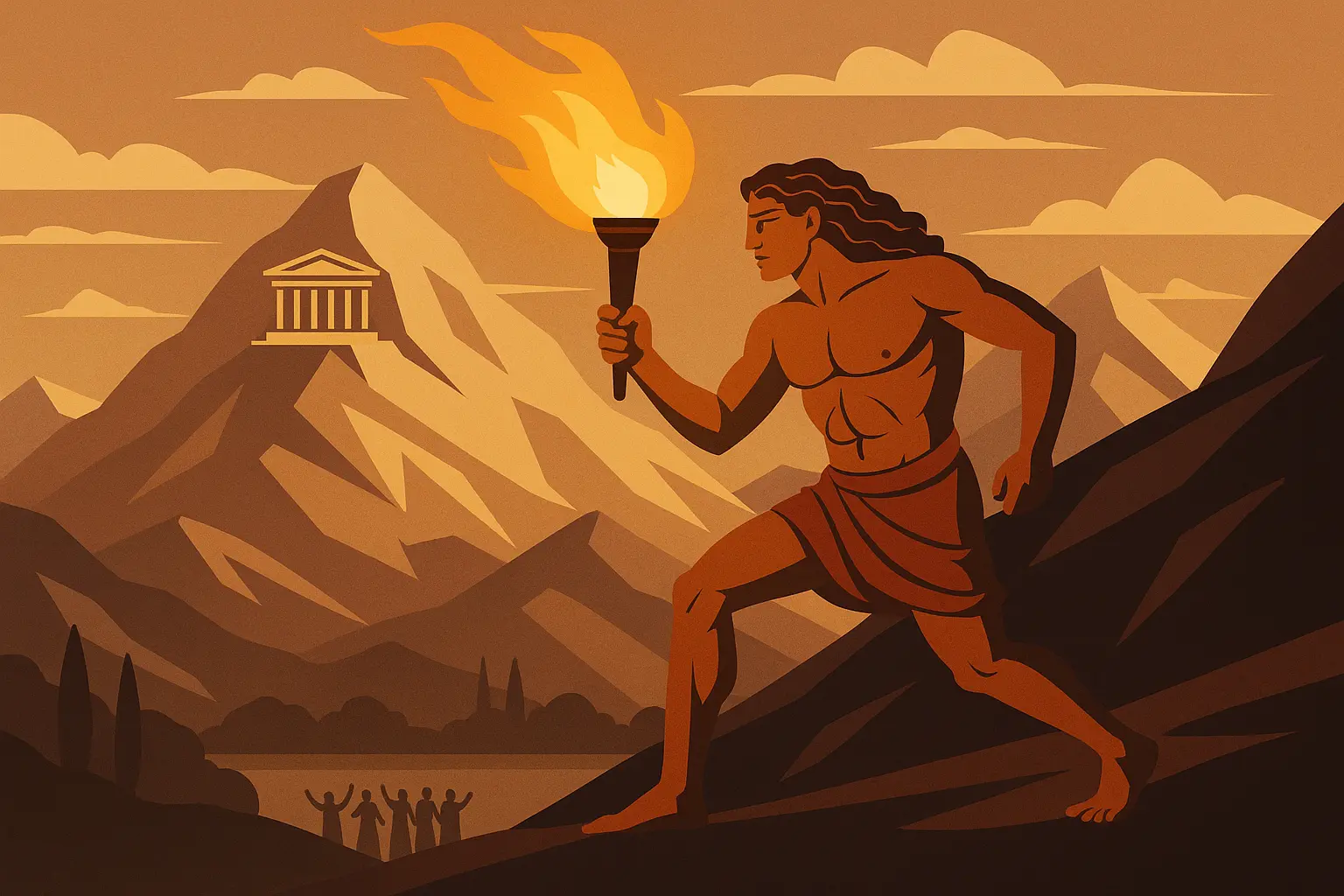
15. Pandora’s Box
The first woman’s curiosity unleashes evil into the world but also preserves hope. This story examines the double-edged nature of knowledge, the consequences of curiosity, and the essential role of hope in human survival. Plot twist: curiosity might kill the cat, but it also keeps hope alive.
Pandora’s tale raises questions about whether ignorance is truly bliss and demonstrates how even catastrophic mistakes can contain seeds of redemption. Greek mythology often explores the complex relationship between knowledge and happiness.
16. Persephone and Hades
The goddess of spring’s abduction to the underworld explains the seasons while exploring themes of loss of innocence, the cycle of life and death, and how trauma can be transformed into wisdom and power. This story is complicated—it’s about kidnapping, but also about finding strength in impossible situations.
Persephone’s story shows how victims can reclaim agency and find strength in their experiences, making it particularly relevant to modern discussions about recovery and empowerment. The mythology demonstrates that even the most traumatic experiences can lead to personal growth and newfound power.
17. The Titanomachy
The war between the Titans and Olympian gods represents the struggle between old and new orders. This cosmic conflict explores themes of generational change, the evolution of power structures, and the price of progress. Think of it as the ultimate family business takeover.
The story demonstrates how social and political revolutions often involve conflict between established traditions and emerging ideas, making it relevant to understanding historical and contemporary social changes. Greek myths show that change, even positive change, rarely comes without struggle.
Transformation and Metamorphosis
Transformation stories explore how characters change in response to extreme circumstances, divine punishment, or personal choices. These tales examine the fluid nature of identity and the consequences of our actions, showing how external changes often reflect internal realities.
The metamorphoses serve as powerful metaphors for personal growth, punishment, and the ways trauma can fundamentally alter who we are. Greek mythology uses physical transformation to represent psychological and spiritual changes that occur throughout human experience.
|
Character |
Original Form |
Transformed Into |
Why It Happened |
What It Means Today |
|---|---|---|---|---|
|
Daphne |
Nymph |
Laurel Tree |
Escaping Apollo’s advances |
Sometimes escape requires radical change |
|
Narcissus |
Beautiful Youth |
Flower |
Self-obsession |
Social media addiction consequences |
|
King Midas |
Greedy King |
Cursed Touch |
Granted wish backfires |
Money can’t buy happiness |
|
Arachne |
Skilled Weaver |
Spider |
Challenging Athena |
Note to self: never challenge a goddess |
18. Daphne and Apollo
A nymph transforms into a laurel tree to escape the sun god’s unwanted advances. This story addresses themes of consent, the abuse of power, and how victims sometimes must sacrifice their humanity to preserve their integrity. It’s a harsh reminder that sometimes the only way to maintain your autonomy is through extreme measures.
Daphne’s transformation represents the extreme lengths people will go to maintain their autonomy, making this tale particularly relevant to modern discussions about harassment and bodily autonomy. The mythology shows that sometimes escape requires radical change.
19. Narcissus and Echo
Narcissus is basically the first influencer who got way too obsessed with his own content. The beautiful youth falls in love with his own reflection while the nymph Echo wastes away from unrequited love. This tale warns against vanity and self-obsession while exploring the nature of authentic versus superficial love.
The story of Narcissus offers a perfect parallel to modern social media culture. Just as Narcissus became obsessed with his own reflection, many people today become fixated on their online image, constantly seeking validation through likes, comments, and shares. The tale warns that excessive self-focus prevents authentic connections—much the way social media can create the illusion of connection while actually isolating users from meaningful relationships. Anyone who’s ever been ghosted can relate to Echo—losing your voice in a relationship is heartbreaking.
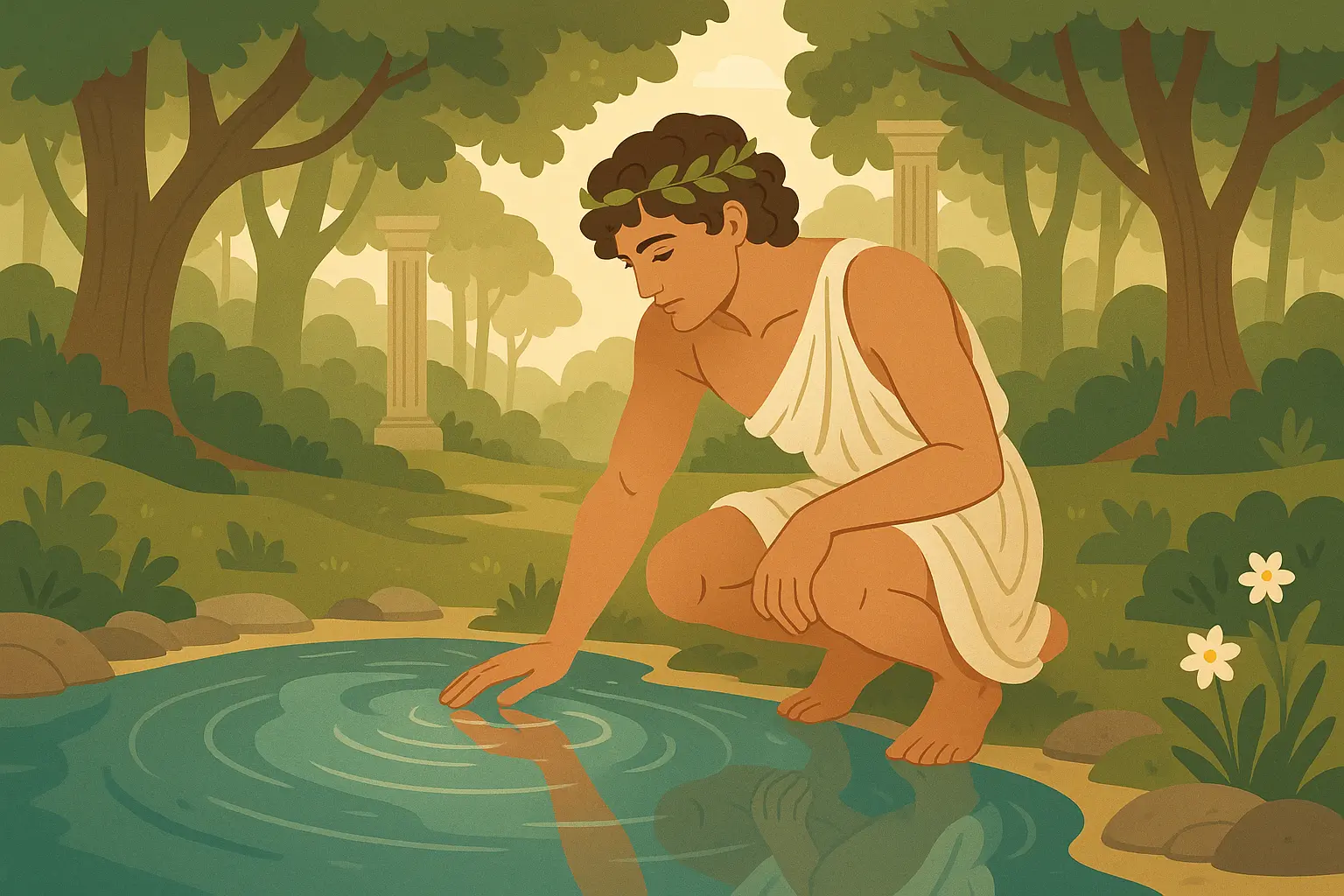
20. King Midas and the Golden Touch
Midas learned the hard way that you can’t hug your kids with money. The greedy king’s wish that everything he touches turn to gold becomes a curse when he cannot embrace his daughter. This story teaches about the danger of materialism and how our desires can destroy what we truly value.
Plot twist: the “golden touch” sounds awesome until you realize you can’t eat gold or hug your family. Midas learns that wealth cannot replace human connection and that getting exactly what we think we want can be the worst possible outcome. Greek mythology frequently explores how our greatest desires can become our greatest curses.
21. Arachne’s Web
A mortal weaver challenges Athena and is transformed into a spider. This story explores the tension between human ambition and divine authority, the price of hubris, and how our talents can become both our greatest asset and our downfall. Note to self: never challenge a goddess to a weaving contest.
Arachne’s fate demonstrates the importance of humility and respect for those in positions of authority, while also questioning whether such authority is always justified. The mythology teaches that skill without wisdom can lead to destruction.
Wisdom, Justice, and Moral Lessons
These stories focus on moral decision-making, the consequences of choices, and the complex nature of justice and wisdom. They explore how seemingly simple decisions can have far-reaching consequences and examine the burden of knowledge and power.
These tales serve as philosophical explorations of ethics, responsibility, and the human condition, offering insights that remain relevant to contemporary moral dilemmas. Greek mythology provides frameworks for understanding complex ethical situations that have no easy answers.
22. The Judgment of Paris
Asked to choose the most beautiful goddess, Paris selects Aphrodite over Hera and Athena, setting in motion the Trojan War. This story examines how seemingly simple choices can have complex consequences and the danger of superficial judgments. If you’ve ever made a promise you couldn’t keep, this story will make you cringe in recognition.
Paris’s decision demonstrates how personal preferences and biases can lead to catastrophic outcomes, making this tale relevant to discussions about decision-making and unintended consequences. The mythology shows that every choice carries weight beyond what we can immediately see.
23. Cassandra’s Curse
The Trojan princess receives the gift of prophecy but is cursed never to be believed. Her story explores the isolation of those who see truth others cannot accept and the tragedy of having knowledge without the power to act on it. Ever had someone refuse to listen to obvious warnings? That’s Cassandra’s entire existence.
Cassandra’s plight resonates with modern whistleblowers, scientists warning about climate change, and anyone who struggles to communicate important truths to skeptical audiences. Greek myths often examine the burden of unwanted knowledge.
24. The Sword of Damocles
A courtier who envies the king’s power learns about the constant dangers of leadership when forced to sit beneath a sword hanging by a thread. This tale teaches about the hidden burdens of power and authority. Turns out being in charge isn’t as fun as it looks from the outside.
The story demonstrates that positions of power come with constant stress and responsibility that may not be visible to outside observers, making it relevant to discussions about leadership and the true costs of success. The mythology reminds us that what appears desirable from the outside may carry hidden dangers.
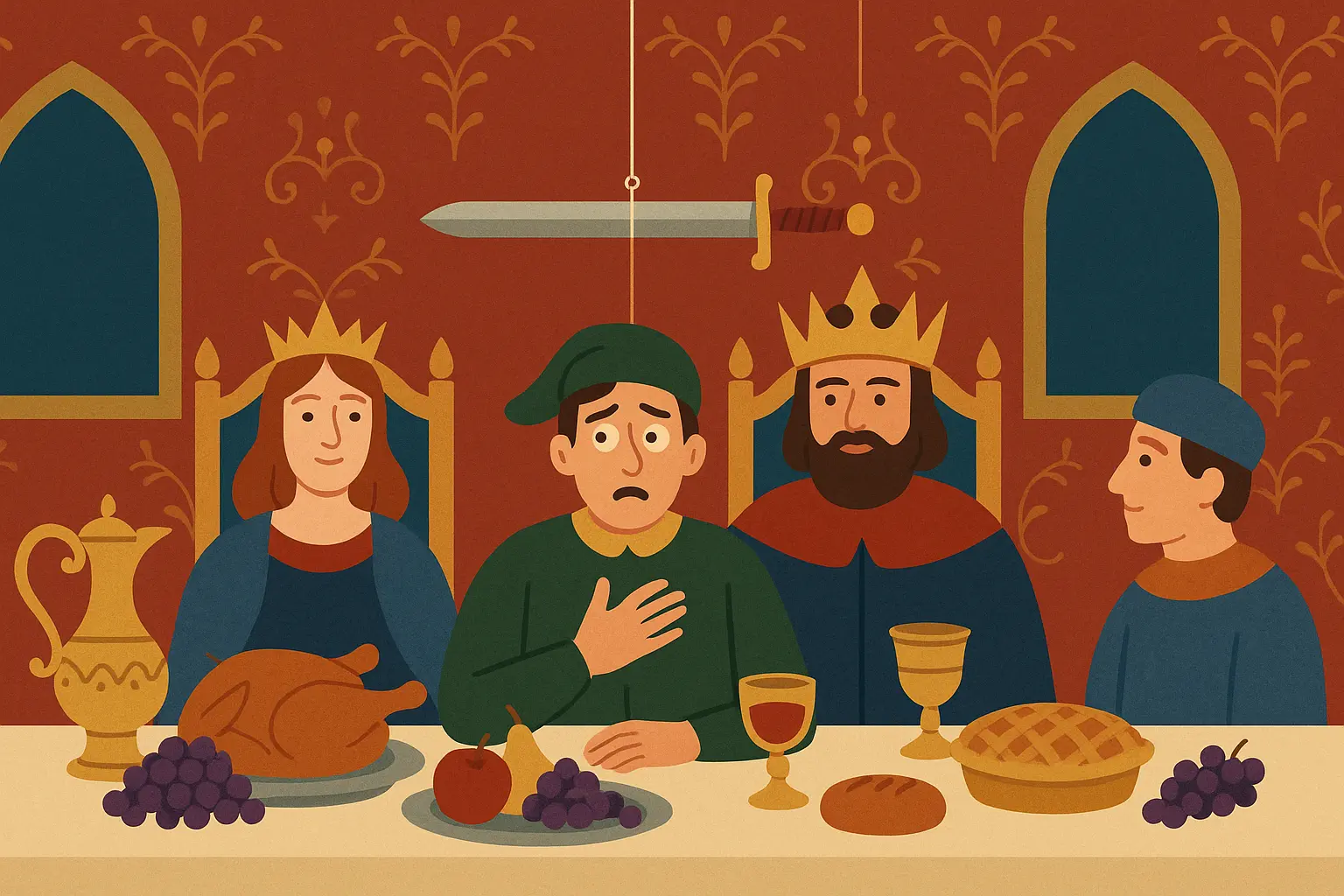
25. Sisyphus’s Eternal Task
Condemned to push a boulder up a mountain for eternity, only to watch it roll back down, Sisyphus represents the human condition of endless struggle. This story explores finding meaning in repetitive tasks and maintaining dignity despite futile circumstances. Ever feel like you’re stuck in an endless loop at work? That’s Sisyphus, and somehow he found a way to deal with it.
Sisyphus’s punishment has become a powerful metaphor for the absurdity of existence and the importance of finding purpose in seemingly meaningless activities. Greek myths teach us that how we respond to our circumstances matters more than the circumstances themselves.
The Stories That’ll Stick With You
Understanding the depth and complexity of Greek stories requires examining both intricate epics and simpler tales to appreciate their different approaches to storytelling and moral instruction. Complex stories offer multiple layers of meaning and sophisticated narrative techniques, while simpler stories provide clear, accessible lessons through straightforward plots.
Both types serve important functions in the Greek storytelling tradition and offer different benefits to modern readers seeking entertainment, education, and personal insight. These varying levels of complexity mirror what we see in great storytelling examples that demonstrate how different narrative approaches serve different purposes and audiences.
Complex Stories – The Mind-Benders
The Odyssey stands as perhaps the most influential adventure story in Western literature. Odysseus faces challenges that mirror modern life: the temptation to abandon responsibilities (Lotus Eaters), the danger of pride (Cyclops Polyphemus), the choice between easy pleasure and duty (Sirens), and the test of loyalty in relationships (Penelope’s suitors).
Each episode provides a masterclass in character development and moral decision-making. The story’s episodic structure allows for deep exploration of different human weaknesses and strengths, making it a comprehensive guide to navigating life’s challenges. The mythology demonstrates how wisdom comes through experience and how true heroism involves internal growth as much as external achievement.
The House of Atreus demonstrates how family trauma perpetuates across generations. Atreus serves
The House of Atreus demonstrates how family trauma perpetuates across generations. Atreus serves his brother Thyestes his own children in a stew (seriously, Greek mythology does NOT mess around), leading to a curse that affects their descendants. Agamemnon sacrifices his daughter for favorable winds to Troy, prompting his wife Clytemnestra to murder him upon his return. Their son Orestes must then kill his mother to avenge his father, showing how cycles of violence consume families until someone chooses to break the pattern.
This multigenerational saga reveals how unresolved conflicts and revenge create destructive patterns that can only be stopped through conscious choice and forgiveness.
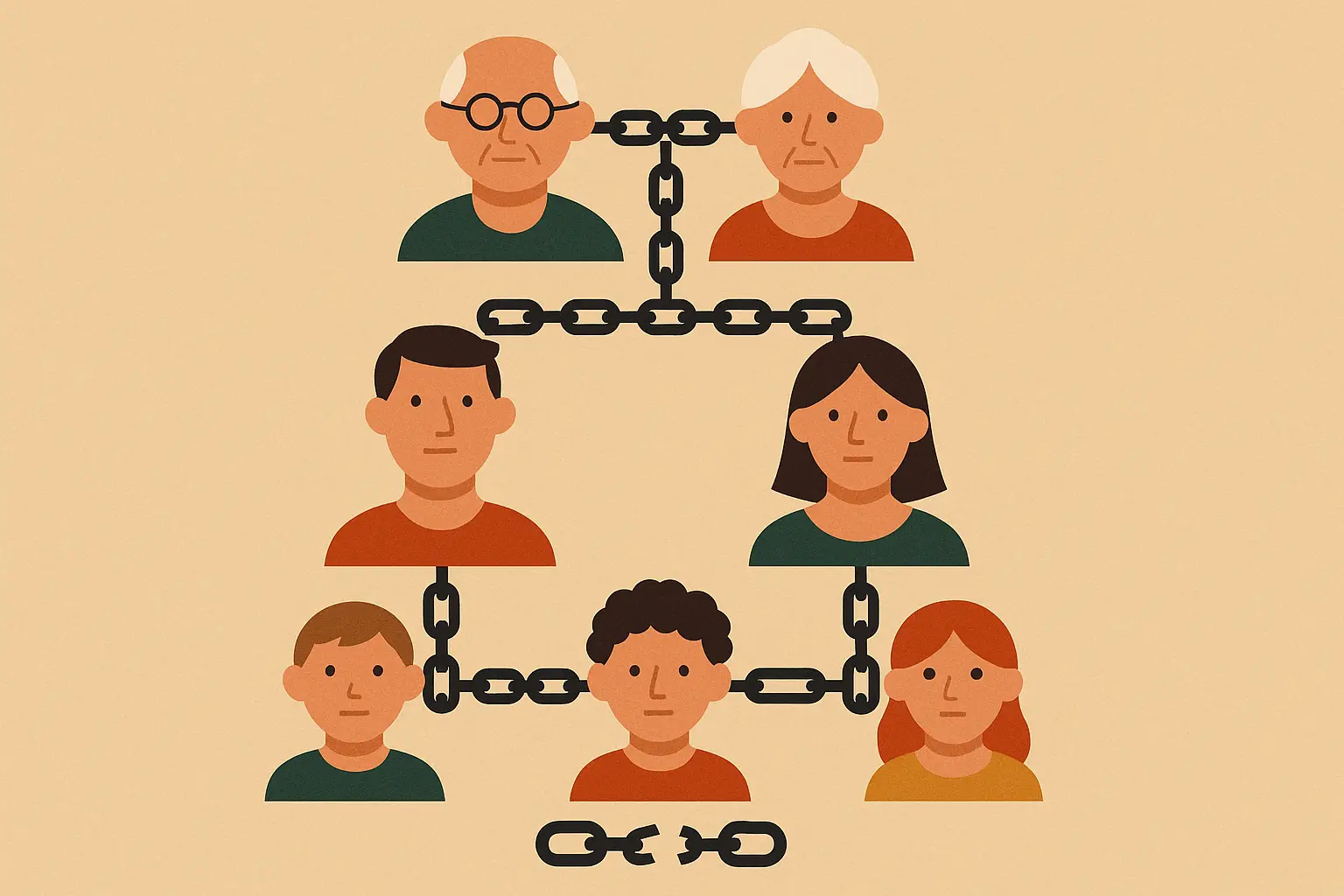
Simpler Stories – The Life Lessons
King Midas provides a clear cautionary tale about greed. When everything he touches turns to gold, including food and his beloved daughter, Midas learns that material wealth cannot replace human connection and basic needs. The story’s straightforward plot makes its message immediately accessible: our desires can become our curses when we prioritize material gain over relationships and genuine happiness.
Narcissus and Echo offers a direct lesson about self-obsession. Narcissus becomes so enamored with his reflection that he wastes away, while Echo, who can only repeat others’ words, demonstrates how losing one’s voice leads to invisibility and irrelevance. The parallel fates of both characters show how authentic connection requires both self-awareness and the ability to truly see and hear others.
Do These Stories Actually Hold Up Today?
Evaluating Greek stories against established criteria helps identify which tales offer the greatest value for modern readers. This assessment considers cultural impact, contemporary relevance, educational potential, and creative adaptation possibilities.
By analyzing stories across these dimensions, we can understand why certain myths have endured while others have faded, and how different stories serve different purposes for contemporary audiences seeking entertainment, education, or creative inspiration. Greek mythology provides a rich catalog of narratives that continue to resonate because they address fundamental human experiences.
|
Story Category |
How Much They Influence Culture |
Modern Relevance |
Educational Value |
How Well They Adapt |
|---|---|---|---|---|
|
Heroic Journeys |
9/10 – Everyone knows these |
High – Personal growth never gets old |
9/10 – Great character lessons |
10/10 – Perfect for modern adventures |
|
Love Stories |
8/10 – Romance is eternal |
High – Relationships are complicated |
7/10 – Emotional intelligence |
8/10 – Easy to update |
|
Family Drama |
9/10 – Therapy sessions reference these |
Very High – Family trauma is universal |
10/10 – Psychology goldmine |
7/10 – Heavy themes |
|
Divine Intervention |
7/10 – Less direct influence |
Medium – Power dynamics |
8/10 – Authority lessons |
6/10 – Fantasy elements |
|
Transformation |
8/10 – Great metaphors |
High – Identity questions |
9/10 – Consequence teaching |
9/10 – Symbolic power |
|
Wisdom Tales |
8/10 – Moral reference points |
High – Ethics never go out of style |
10/10 – Clear life lessons |
7/10 – Philosophical depth |
Cultural Significance Analysis
High Impact Stories: The Odyssey, Oedipus Rex, and the Trojan War cycle score highest for cultural significance. These stories have inspired countless adaptations, references in literature, and continue to influence modern storytelling techniques. Their impact extends beyond literature into psychology (Oedipus complex), philosophy, and popular culture, making them essential knowledge for understanding Western cultural references.
Moderate Impact Stories: Perseus and Medusa, Orpheus and Eurydice, and Prometheus score well for their symbolic power and frequent cultural references, though they haven’t generated as many direct adaptations. These stories provide powerful metaphors that appear regularly in art, literature, and everyday language, making them valuable for cultural literacy.
Specialized Impact Stories: Tales such as Cassandra’s Curse and the Sword of Damocles have become powerful metaphors in specific contexts (politics, psychology) but have narrower cultural reach. While not as universally known, these stories offer precise insights into particular aspects of human experience and remain highly relevant within their specialized domains.
Modern Relevance Assessment
Universally Relevant: Stories dealing with family dynamics (House of Atreus), personal growth (Heracles’ Labors), and moral choices (Judgment of Paris) translate directly to contemporary situations. These tales address timeless human experiences that remain constant across cultures and historical periods, making them immediately applicable to modern life.
Contextually Relevant: Transformation stories such as Daphne and Apollo gain new relevance in discussions of consent and power dynamics, while Prometheus speaks to debates about technology and progress. These stories acquire fresh meaning as social contexts evolve, demonstrating the flexibility of mythological narratives to address contemporary concerns.
Symbolically Relevant: Tales such as Sisyphus and Pandora’s Box provide powerful metaphors for modern psychological and philosophical concepts. While their literal content may seem distant, their symbolic meaning resonates strongly with contemporary discussions about existentialism, hope, and the human condition.
Educational Value Rankings
Highest Educational Value: Complex narratives such as The Odyssey and Oedipus Rex offer multiple lessons about character, plot development, and thematic depth. These stories provide rich material for analysis and discussion, making them valuable for both literary education and personal development.
Strong Educational Value: Stories with clear moral lessons (King Midas, Narcissus) provide accessible entry points for discussing ethics and human nature. Their straightforward messages make them excellent teaching tools for younger audiences or those new to Greek mythology.
Specialized Educational Value: Mythological explanations (Persephone and the seasons) offer insights into ancient worldviews and the human need to understand natural phenomena. These stories provide valuable context for understanding how ancient cultures made sense of their world.
Creative Adaptation Potential
Highly Adaptable: Hero’s journey stories (Perseus, Theseus, Jason) provide flexible frameworks for modern adventures and personal growth narratives. Their basic structures can be transplanted to contemporary settings while maintaining their essential appeal and meaning.
Moderately Adaptable: Love stories and family dramas translate well to contemporary settings with minor adjustments to cultural context. The emotional core of these stories remains relevant, though specific details may need updating for modern audiences.
Symbolically Adaptable: Transformation and punishment stories work best as metaphorical or allegorical adaptations rather than direct retellings. Their power lies in their symbolic meaning, which can be expressed through various narrative forms and contemporary contexts.
How Nairrate Can Help You Create Your Own Epic Stories
The timeless appeal of Greek mythology demonstrates masterful storytelling techniques that remain crucial for contemporary writers. These ancient tales show how compelling openings, character-driven conflicts, and emotionally resonant conclusions create stories that endure across millennia.
Modern writers can learn from these classical principles and apply them to contemporary narratives using AI-powered tools that help structure stories with the same enduring appeal as Greek myths. The precision required in Greek storytelling—where every element serves the larger narrative purpose—mirrors the economy of language that makes any story powerful.
Just as ancient bards had to capture their audience’s attention immediately and maintain it throughout lengthy oral performances, modern writers must craft every sentence to advance their story meaningfully. Writers seeking to master these techniques can benefit from understanding the brain science behind effective storytelling that explains why these ancient patterns continue to resonate with modern audiences.

If these stories inspire you to write your own (and they should!), tools like Nairrate’s AI Story Generator can help you capture that same timeless magic that makes people still care about stories from thousands of years ago:
Story Structure Inspiration: Greek myths follow proven narrative patterns—the hero’s journey, tragic flaws leading to downfall, transformation through trials. When you’re struggling with plot development, Nairrate can suggest story frameworks inspired by these classical structures, helping you build narratives with the same enduring appeal.
Character Development: The complex characters in Greek mythology—from Odysseus’s cunning to Medea’s passionate revenge—demonstrate how internal conflicts drive compelling stories. Nairrate’s character generation tools can help you create similarly multi-dimensional protagonists with clear motivations and meaningful character arcs.
Thematic Depth: Greek stories endure because they explore universal human experiences. Whether you’re writing about family conflict (inspired by the House of Atreus), personal transformation (following metamorphosis tales), or moral dilemmas (echoing the Judgment of Paris), Nairrate can help you develop these themes with the depth and nuance that makes stories memorable.
For writers interested in shorter narratives, exploring flash fiction techniques can help distill mythological themes into powerful, concentrated stories.
A modern writer using Nairrate might input “create a story about a tech entrepreneur who gains everything they want but loses what matters most”—drawing inspiration from King Midas. The AI could suggest opening lines such as “Sarah’s algorithm could predict market trends with 99.7% accuracy, but it couldn’t warn her that success would turn her golden touch into a curse.” This demonstrates how classical themes can be seamlessly integrated into contemporary narratives using AI assistance.
Whether you’re reimagining Pandora’s Box for a contemporary setting, exploring themes of hubris in a modern context, or simply seeking to infuse your original stories with the timeless appeal of Greek mythology, Nairrate provides the creative partnership to help transform classical inspiration into compelling modern narratives.
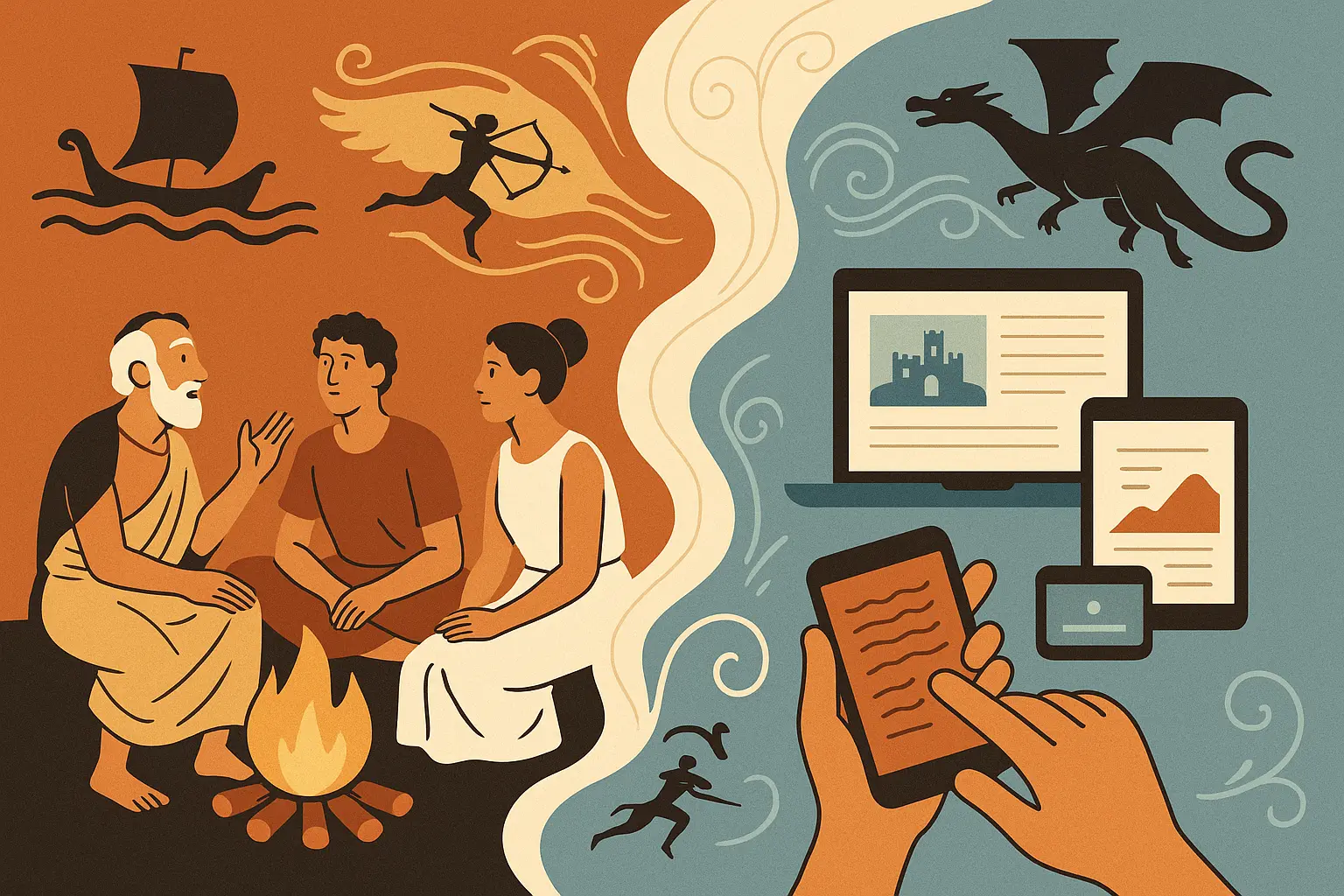
Why These Stories Still Matter
Here’s the bottom line: people have been dealing with the same stuff for thousands of years. These stories prove that whether you’re facing a literal monster or just trying to get home after a really bad day, the struggles are universal. And somehow, that’s actually pretty comforting.
Greek stories continue to captivate readers because they address fundamental questions about human nature, morality, and our place in the universe. These 25 essential tales represent the finest examples of storytelling that has influenced literature, psychology, and popular culture for thousands of years. From the epic adventures of Odysseus to the tragic transformation of Narcissus, each story offers unique insights into the human experience while demonstrating sophisticated narrative techniques that modern writers still study and emulate.
The enduring power of these myths lies in their ability to help us understand ourselves and our relationships with others. Whether you’re drawn to heroic quests that test courage and determination, love stories that explore passion and devotion, or cautionary tales that warn against hubris and greed, Greek mythology provides a rich foundation for both personal reflection and creative inspiration.
As you explore these timeless stories, remember that their greatest value comes from their ability to speak to contemporary concerns while maintaining their ancient wisdom. The challenges faced by Greek heroes mirror our own struggles with temptation, responsibility, and moral choice, making these ancient tales remarkably relevant guides for navigating modern life. Greek mythology continues to offer profound insights into the human condition, proving that some truths transcend time and culture. These Greek myths remain as powerful today as they were millennia ago, serving as both entertainment and wisdom for anyone willing to listen to their enduring messages.



Add comment